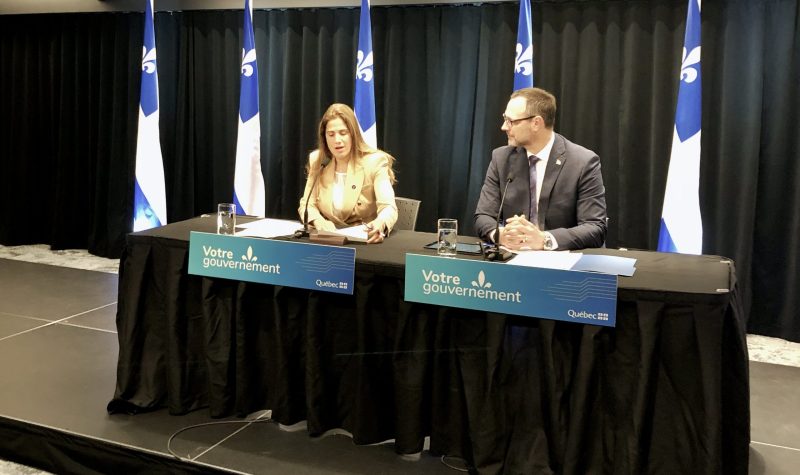The CAQ government will double tuition fees for out-of-province students starting next fall, say Minister of Higher Education Pascale Déry and Minister of the French Language Jean-François Roberge.
Speaking in Montreal on Friday, Déry and Roberge argued that Quebec taxpayers have subsidized this mostly anglophone student base for too long. The ministers say the roughly $100 million the government is looking to bring in each year will be reinvested in the French network to “rebalance” English and French higher education.
The CAQ is upping base tuition fees for incoming students in undergraduate and professional master’s programs. Currently, the minimum students pay is $8,992 per year; that’ll go up to roughly $17,000.
Déry says this change will help recoup the "very high amount of money for students who don’t stay here" paid for by the government and taxpayers, but did not specify whether that amount factors in the economic benefits these students bring to Quebec.
When asked for numbers on just how many students do or don’t stay in the province, Déry admitted the government didn’t have the figures. It’s unclear whether they know the number of francophone students who stay or leave following their degrees either.
"It's very difficult to have numbers but nobody is going to contradict what I'm saying today, and, obviously, it comes also from the English universities," she told reporters.
She also claimed some out-of-province students have paid lower fees at Quebec schools than they would have in their home province. This may be true in some cases, but it's not likely on the whole: Statistics Canada pegs the average undergraduate tuition in Canada at just over $7,000, some $2,000 less than the minimum that out-of-province students currently pay in Quebec. Déry says Quebec universities will remain competitive after the increase, though that will put tuition at $10,000 above the national average.
The ministers didn’t give estimates for the fee increases international students will face, but said that they too will have to shell out more to study in the province. Students already in the system, as well as those from France, Belgium, and any other countries with special funding agreements, will be exempt. Déry said that more such agreements could be on the horizon.
According to the ministers, the change is a response to the decline of the French language. Census data released last year showed that from 2016 to 2021, the share of Quebec residents whose first official language was English rose by only one percentage point. The decline in French spoken at home in that same time frame was just two and a half percentage points.
"Learning the language was one of reasons why I wanted to move to Montreal and go to McGill," says McGill undergraduate student Raghd Metwally.
Like many others, she finds it difficult to learn French in a primarily anglophone environment, but questions why the government is hiking fees rather than investing in language learning. McGill was Metwally's first choice, but a $17,000 price point would have made for a tough sell, she says.
"Even though I would've wanted to go to McGill... I don't think I would have."
When reached for comment on Thursday, a McGill University spokesperson provided this statement:
“We are concerned that changes to tuition for international students and those coming from other Canadian provinces could have a serious impact on McGill’s ability to attract and retain the talent that contribute so significantly to Quebec’s economy and provide our businesses with the highly qualified personnel they so desperately need.
"Montreal is known internationally as one of the world’s great education destinations, as demonstrated by Montreal’s consistent placement in the QS Best Student Cities ranking. Whether or not they remain in Quebec after graduation, students from outside Quebec make an enormous contribution to the vitality and economy of Quebec and Montreal.”
Listen to the full story here:


